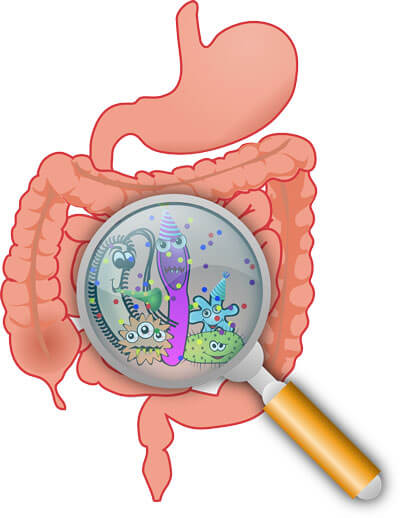Who knew we’d be talking about the rather disgusting topic of gut bacteria these days? Not something I would have thought about 10 years ago.
But here we are in 2018, where research has discovered some of the importance of our internal critters – how they help us and how they hurt us. NPR recently published a story (August 6, 2018) about a small study that puts some of the blame of diet failure on your gut bacteria.
The Study
The premise of the study is that people have different “microbial makeups”, and this influences how they respond to a diet. The participants followed a low-calorie diet and were tracked for three months.Those with dominant Phascolarctobacterium were more successful losing weight than those with dominant Dialister bacteria.
Based on these results, the authors of the study think that some bacteria break down undigested food into more digestible components, which the body then absorbs as extra calories. The researchers think it’s possible that these extra calories may be enough to limit weight loss. They plan a larger follow-up study.
While I am glad that researchers are analyzing the effects of various kinds of gut bacteria, I have some problems with this study:
Problem #1: It is diet-based
Any premise about weight loss that is based on a diet is fatally flawed. People have been trying to lose weight by dieting for almost a century and it rarely works as a permanent solution. Yet there is this assumption – even in the scientific community – that it’s the only valid approach.
Thus none of the research focuses on why dieting doesn’t work. Instead, it focuses on studying micro metabolic functions. This is an effort to prove there’s some yet unidentified sub-system that sabotages the weight loss. The goal seems to be identifying that sub-system, so they can “fix” it with a medical treatment or drug.
Now, for some individuals, there may well be a metabolic malfunction. But for the majority, there is nothing wrong with our internal processes other than our own interference. I tried – unsuccessfully – to lose weight by dieting for 43 years, and I truly believed that I had a genetic defect. I believed that my appetite was always a little greater than what it should be, and that if I didn’t control what I ate, I would continually gain weight.
What I found out by quitting dieting of any kind, was that dieting itself was one of the primary factors driving my inability to lose weight permanently. Since dieting is a behavior forced on us by “experts,” it was external factors that need fixing, not the internal ones.
Problem #2: It is calorie-based
The solution to weight loss does not lie with limiting calories. It involves a very broad set of variables. Food is worth much more than just a caloric value. Your body processes 200 calories of a candy bar differently than 200 calories of broccoli (if you could even consume that much broccoli). The calories-in/calories-out formula only applies over a very long term – like 1 year. And I’m sure most nutritionists know this.
Food industry influence
So where did the emphasis on calories come from? The food industry. Government health agencies telling people to consume less of any particular food brings the food lobbyists out in force to defend their product. Which gets the attention of politicians. Who then apply pressure on the agencies to change the message. This makes sense if you follow the money: lobbyists give $$ to politicians, who then give $$ to the agencies.
However, this puts the health agencies in a real bind. The only way they can make the message not target any particular food product is to convert the problem into calories. Suddenly, instead of “eat less meat”, “eat less fat”, “eat less sugar”, or “eat less of everything,” the edict becomes: count your calories. This implies that it doesn’t matter what you eat, as long as you keep your calories below x/day. And this allows the food industry equal influence over your food consumption.
Bad advice for health
According to this formula, you can justify consuming unlimited quantities of diet soda (0 calories), plus snack foods, sugar, chips, French fries, or whatever, as long as you don’t exceed the recommended number of calories/day for your demographic. Lobbyists happy. Politicians relieved. Agencies continue to get funded.
But following this paradigm doesn’t necessarily lead to health. You might lose weight eating 800 calories of candy/cinnamon rolls/food bars/chips. But would you be healthy on that kind of diet? Hardly. On the other hand, if you consumed 2000 calories of protein, vegetables, whole grains and fruits, you might not lose weight, but you would be healthier.
A study where the participants are put on a limited calorie diet, and gut bacteria are analyzed, may be useful for scientists, but I don’t think it will accomplish anything practical for the average person trying to lose weight. The calorie approach doesn’t take into consideration the whole human being – which is where the focus should be.
My Theory: gut bacteria influences appetite
In my book Resetting Normal: The End of Yo-Yobesity, I propose my own theory on this topic, although my take on the how and why is different from the premise and conclusion of the study. That’s likely because scientists take a deep dive into metabolic functions, while I take a higher level, metaphoric view.
The study’s gut bacteria/calorie theory seems far-fetched to me, but I do believe that gut bacteria influences weight loss indirectly via its influence on appetite.
Here is a quote from Resetting Normal:
“I believe the type of bacteria inhabiting someone’s gut is directly related to what they eat, and the type of bacteria inhabiting someone’s gut influences what that person wants to eat. In other words, your colony of gut bacteria has evolved to live on whatever you feed it. It naturally wants to continue to survive, so it affects metabolic processes that drive you to feed it more of the same.
What kind of gut bacteria do you cultivate when you drink soda (regular or diet), consume a lot of sugar and refined carbohydrates, and continually bombard it with chemically processed additives like artificial flavors and colors, modified food starch, and preservatives? You get the kind that thrives on junk and wants more. The kind that makes you unable to control your appetite, and consequently makes you gain weight.
Now suppose you gradually start changing what you eat to real, whole foods. At first, nothing noticeable happens. But then, over time, a colony of gut bacteria that thrives on those foods begins to grow, and it wants to survive. So it manipulates your metabolism in such a way that you begin to want more and more of those healthy foods. As you phase out the junk foods, the old, bad colony of gut bacteria shrinks, and with it, your cravings for that kind of food.”
The Takeaway
I welcome scientific studies, as they expose pieces of the metabolic puzzle that scientists will eventually put together. However, while we wait for that final solution, we can take action at a more human-centric level.
The bottom line is that I believe you can change your colony of gut bacteria without resorting to anything more that changing what you eat. It doesn’t happen overnight, but over the long haul, you will eat less and it will be easier to lose weight and maintain that weight loss.
References
Nestle, Marion. Food Politics: How the Food Industry Influences Nutrition and Health. Berkeley: University of California Press, Ltd., 2007.
Simon, Michele. Appetite for Profit: How the Food Industry Undermines our Health and How to Fight Back. Ebook. Nation Books, 2009. See especially:
- Chapter 2: Personal Responsibility, Energy Balance, and Other Distractions
- Chapter 7: Exposing Government Complicity



